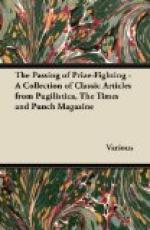* * * * *
Between the rising of the partisans of the Duchesse DE BERRI and the dawn of the Tractarian movement there would not seem, at first blush, to be any very close association apart from the coincidence of their dates; yet in The Vision Splendid (MURRAY), by D.K. BROSTER and G.W. TAYLOR, a link is furnished in the person of an English clergyman’s daughter, who marries a Frenchman of the “Legitimist” aristocracy, and is loved, before and afterwards, by an enthusiastic disciple of the Oriel Common Room. But the link is too slight to give a proper unity to the tale; and we have to fall back upon contrasts. Even so, the two modes of life which made up, between them, the experience of the Comtesse de la Roche-Guyon (nee Horatia Grenville) are too cleanly severed by the estranging Channel to be brought into sharp antithesis, except in the heart of the one woman. And, since it is difficult to understand why anyone so British in her independence and aloofness should have surrendered her heart to the first good-looking Frenchman who came her way, we never get to be on very intimate terms with that organ. The construction of the story tends to break up the action and make its interest desultory. While we are spending a hundred odd pages at one time and fifty odd at another in Paris and Brittany we forget, very contentedly, about Oriel; and while we are in residence at Oxford we are practically cut off—no doubt, to our spiritual gain—from the things of France. The authors seem to belong to the solid old-fashioned school that had the patience to spread itself and leave as little as might be to the imagination. I suspect one of them of supplying the foreign information and the other of being the correspondent on home and clerical affairs. I don’t know how many of them—if any—are women, but I seem to trace a female hand in some of the domestic details. But the book contains strong matter, too—both of narrative and characterization; as in the dying of Armand de la Roche-Guyon, and the picture of his lover, Madame de Vigerie. And there is something of the inspiration of the Holy Grail in that “Vision Splendid” which heartens Tristram Hungerford to make sacrifice of his passion that he may give his soul unshared to the service of the Church.
* * * * *
Until I had read Mr. A. RADCLYFFE DUGMORE’S book and revelled in his most wonderful photographs I had never wished to be a caribou; but now that I have fully digested The Romance of the Newfoundland Caribou (HEINEMANN) there is only one animal whose lot in life I really envy. This is due not to a natural sympathy with caribous (for, as the author says, “In England it is quite the exception to find anyone who knows what the caribou is, unless he happens to have been to Newfoundland or certain parts of Canada,” and I was never one of the exceptions), but to the extraordinary manner in which




